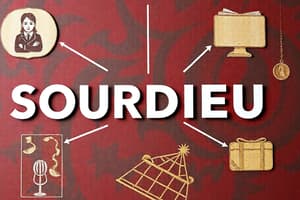Podcast
Questions and Answers
What is sociology?
What is sociology?
- The study of societies and their organization (correct)
- The study of history
- The study of individual behavior
- The study of politics
What is sociological imagination?
What is sociological imagination?
A perspective that relates personal experiences to larger social forces.
During which period did the Industrial Revolution occur?
During which period did the Industrial Revolution occur?
- 2000s
- 1700s-1800s (correct)
- 1900s
- 1500s
What does division of labor refer to?
What does division of labor refer to?
Who is Mark Granovetter?
Who is Mark Granovetter?
Who coined the term sociological imagination?
Who coined the term sociological imagination?
What subjects does sociology overlap with?
What subjects does sociology overlap with?
Who are considered the founders of sociology?
Who are considered the founders of sociology?
What did Karl Marx believe about societies?
What did Karl Marx believe about societies?
What is relational sociology?
What is relational sociology?
What is social conflict?
What is social conflict?
What does economic relationship refer to?
What does economic relationship refer to?
What is class?
What is class?
What are wages?
What are wages?
What is alienation?
What is alienation?
What is solidarity?
What is solidarity?
Who was Emile Durkheim?
Who was Emile Durkheim?
What is mechanical solidarity?
What is mechanical solidarity?
What is organic solidarity?
What is organic solidarity?
What does integration refer to?
What does integration refer to?
What is regulation in sociology?
What is regulation in sociology?
What are norms?
What are norms?
What is anomie?
What is anomie?
What did Marx think caused culture?
What did Marx think caused culture?
Who was Max Weber?
Who was Max Weber?
How did Weber define sociology?
How did Weber define sociology?
What did Weber believe about culture and capitalism?
What did Weber believe about culture and capitalism?
What is methodological individualism?
What is methodological individualism?
What is social action?
What is social action?
What is interpretive understanding?
What is interpretive understanding?
What is culture according to Weber?
What is culture according to Weber?
What was Hull House?
What was Hull House?
What was the Chicago School?
What was the Chicago School?
What is socially-engaged scholarship?
What is socially-engaged scholarship?
What is psychological wage?
What is psychological wage?
What is status?
What is status?
Who was Jane Addams?
Who was Jane Addams?
Who was W.E.B. Du Bois?
Who was W.E.B. Du Bois?
What did Du Bois believe about black labor?
What did Du Bois believe about black labor?
What did Marx believe regarding worker solidarity?
What did Marx believe regarding worker solidarity?
Flashcards are hidden until you start studying
Study Notes
Sociology and Related Concepts
- Sociology studies societal organization and its influence on individual behavior.
- Sociological imagination connects personal experiences to larger societal forces.
- Key disciplines overlapping with sociology include political science, psychology, and economics.
Historical Background
- The Industrial Revolution marked rapid advancements in manufacturing and industry from the late 1700s to the 1800s, transforming societal structures.
- Founders of sociology are significant figures: Émile Durkheim, Karl Marx, and Max Weber.
Key Theorists
- Mark Granovetter explored how social connections influence job seeking and claimed that riots spread like an infectious disease.
- C. Wright Mills is known for introducing the term "sociological imagination."
- Karl Marx, a relational sociologist, believed society is grounded in social conflict, asserting all structures reflect economic conditions.
- Max Weber emphasized understanding social actions through subjective meanings, relating culture to capitalism.
Social Structures and Relationships
- Division of labor refers to the specialization of tasks among workers, enhancing efficiency.
- Relational sociology focuses on how individual identities are shaped by relationships and societal institutions.
- Social conflict arises from differing interests between groups, highlighting tensions within society.
Social Integration and Regulation
- Solidarity describes connections among individuals in society, distinguishing between mechanical (in cohesive societies) and organic (in complex societies) solidarity.
- Integration signifies the degree of connection individuals have within their community.
- Regulation involves societal rules that govern behaviors, while norms indicate expected behaviors.
Alienation and Anomie
- Alienation refers to feelings of disconnection from others and oneself, as discussed by Marx.
- Anomie occurs when a lack of regulation leads to unclear moral standards, underscoring the need for social guidance.
Sociological Perspectives
- Methodological individualism places individuals at the center of social study.
- Interpretive understanding focuses on the meanings ascribed to actions, reinforcing the role of culture in shaping behavior.
Social Reform and Community Engagement
- Hull House, established by Jane Addams, served as a center for social reform, providing assistance to impoverished women and families.
- The Chicago School of Sociology was an innovative group focusing on urban life and social patterns within cities.
- Socially-engaged scholarship emphasizes community involvement in research, promoting the experiences of local members.
Social Status and Recognition
- Status determines social standing relative to others, influenced by factors like race and economic condition.
- Psychological wage refers to symbolic benefits accrued by whites from a system that privileges whiteness.
Contributions from Diverse Figures
- Jane Addams, a pioneer in social work and women's rights, founded Hull House and was the first American woman to receive a Nobel Peace Prize.
- W.E.B. Du Bois, the first African American to earn a Ph.D. from Harvard, co-founded the NAACP and connected slavery to capitalism, advocating for recognition of black labor's role in society.
- Du Bois argued that black labor was fundamental to the Southern social structure and Northern capitalism.
Marx's Perspective
- Marx believed low-paid white workers needed to ally with other oppressed groups to dismantle capitalism, emphasizing solidarity in labor movements.
Studying That Suits You
Use AI to generate personalized quizzes and flashcards to suit your learning preferences.




